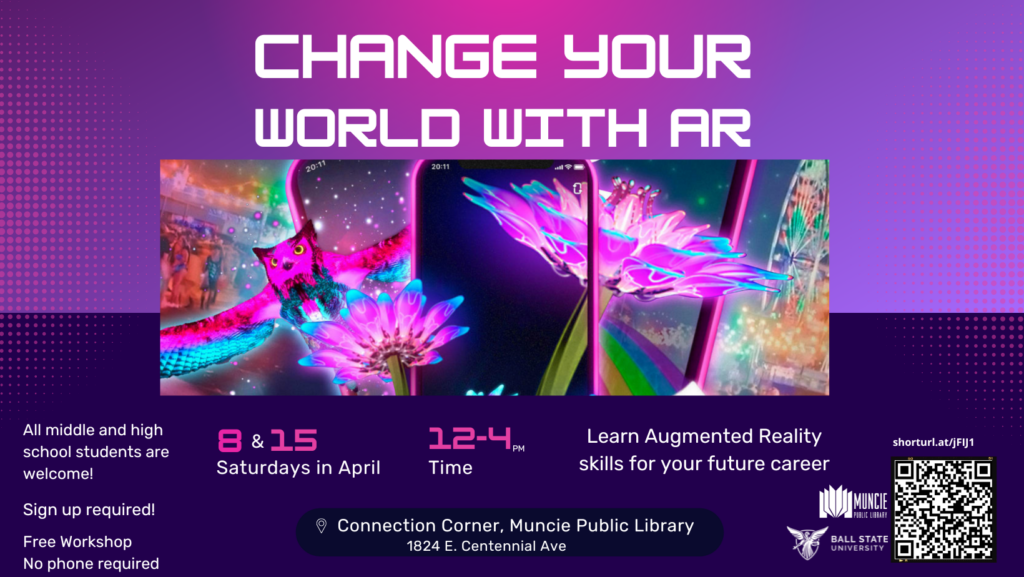By Michelle Kinsey, Office of Community Engagement, Ball State University—
MUNCIE, IN—There are still some real, in-person seats available at the upcoming Augmented Reality workshop for teens in April at Muncie’s Connection Corner.
Ball State University, Muncie Public Library’s Connection Corner and Snapchat are teaming up for the Augmented Reality workshop for middle and high school students. The workshop will be at Connection Corner (1824 E. Centennial Ave.) on two consecutive Saturdays – noon to 4 p.m. April 8 and 15. It is free for all participants. No phone is required. Lunch will be provided.
At the end of the workshop, students will have gained an emerging media skill that they can use for their college applications and digital careers. In addition, Snapchat will send an influencer – who has made a career for themselves by creating AR filters – to talk about the industry and its opportunities.
Sounds cool, right?
We caught up with the creator of the workshop, Josh Fisher, Assistant Professor of Emerging Media, Design, and Development in Ball State’s School of Journalism & Strategic Communication, to learn a little more about this opportunity for area students.
Could you tell us why you wanted to offer these workshops?
I wanted to offer these workshops so that students and children in our small town community are given the same access to opportunities and resources their peers in the larger cities and on the coasts are receiving. With emerging media like Augmented Reality (AR), education is often uneven and unequally distributed. Small communities miss out on the initial engagement and then play a game of catch-up. It is not fair. These workshops give our community’s students the skills they need to directly compete with their peers in other parts of the country. It gives them the skills to engage in a new, emerging economy that relies on immersive media. People may have heard of this economy as the metaverse—undoubtedly one name for it—and I want the children of Muncie and Indiana to be active in its creation.
Why is this type of workshop important now?
The importance of this workshop might be best understood by looking at times in history when other emerging technologies captured widespread attention. We might look at the internet boom of the late ‘90s or the mobile app craze of the 2010s. An entire industry sprouted up overnight, and economic opportunities blossomed. Now, even as the threat of a recession looms, large tech companies are investing millions of dollars into AR and other immersive media. There is a concentrated push in the tech industry to realize the widespread adoption of these technologies. Since these companies are often located in large urban centers, the first folks to learn how to use the technology are centered there. However, this doesn’t need to be the case. And with the help of Snapchat, we can bring accessible tutorials and learning materials to students here in Muncie and central Indiana. With the foundational skills we’ll teach, they can start participating in the immersive media space—being a voice for the technology in our community and the Midwest.
What will students be doing during the workshops?
During the workshop, students will learn how to create Augmented Reality (AR) experiences using Snapchat’s Lens Studio. In the workshop, they will create two AR experiences. The first will be a facial AR filter, where they can use AR to transform their face into a superhero, police officer, firefighter, nurse, doctor, or even Frankenstein. Their only limit is their imagination. The second filter they will create is known as a World Filter. This will allow them to put AR models in their community. Think of this like the Princess Leia hologram in Star Wars. In this instance, we will be taking students through an activity to think about what they would like to see in Muncie—how they might make Muncie magical in their eyes. During this part of the workshop, we’ll ask students to reflect on how they might make that magic real in the community. We aim to move from zeros and ones and holographic bits to atoms, physical material change, and youth-led growth in the community.
The flyer for the event says students will learn AR skills for their “future career.” What does that mean? Can you give us some examples of skills that will be developed?
Certainly! Below is a list of ideas.
- Iterative design and development skills—the most common work process in the tech industry
- Prototyping skills—all apps and designs start from somewhere! Students will learn the prototyping process.
- Augmented Reality Design—the most exciting aspect is that students will be able to develop Augmented Reality design skills that they can and will likely use in college and their future careers.
- Visual Scripting Programming—students will learn a version of programming called Visual Scripting. They will not necessarily write code but instead connect nodes and use behavioral logic to trigger interactions and effects.
- Snapchat’s Lens Studio—Snap’s Lens Studio is an industry standard for creating AR experiences. Major brands and organizations have used the technology for a wild variety of different applications.
If I am a parent, why should I encourage my child to attend?
Parents may hear the name Snapchat and say, “Oh no!” And that’s understandable. Most parents only know Snapchat as a messaging and entertainment tool. However, the company, Snap Inc., is dedicated to developing AR skills for more than entertainment. They have engaged in many advocacy, charity, and educational initiatives throughout the globe. Their philanthropy group, which we are working with, has helped nonprofits and community organizations use the technology for good. I would tell parents to encourage their children to attend so that they can begin learning a unique technology skill that will set them apart. Now, what they will be learning in the course is foundational. Still, it will give them access to the tools they need to build AR experiences for entertainment, journalism, community engagement, fashion, music, education, and more. AR will be an active part of our lives in the next decade. I would tell parents this—your child could be part of the movers and shakers leading that charge, developing the next generation of interactive experiences.
To register, scan the QR code above. Or you can go to: https://bsu.qualtrics.com/jfe/form/SV_bjvAwCddsZe4VIa




